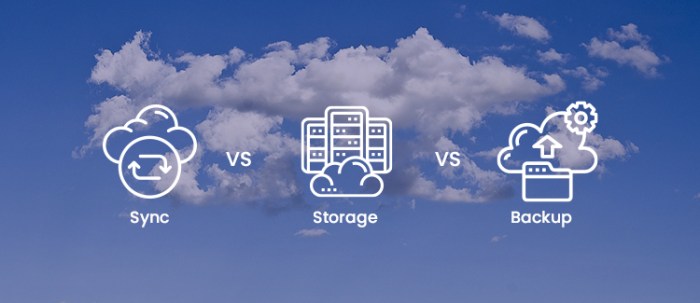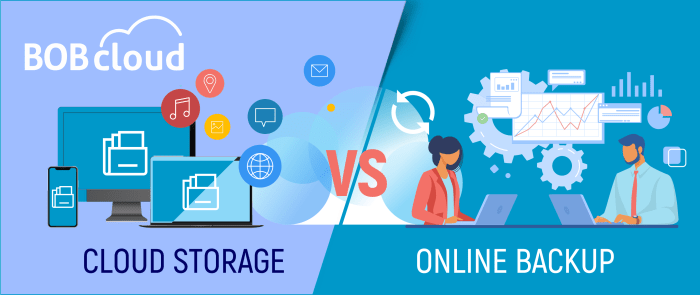What’s the Difference Between Cloud Storage and Cloud Backup?

In the digital age, data is everything. As businesses and individuals alike generate and store more data than ever before, the need for reliable and cost-effective storage solutions has become paramount. Cloud storage and cloud backup are two popular options that offer distinct advantages and use cases.
Understanding the difference between these two services is crucial for making informed decisions about your data storage strategy.
At a high level, cloud storage is a service that allows you to store data on remote servers, accessible from anywhere with an internet connection. Cloud backup, on the other hand, is a service that creates copies of your data and stores them in a separate location, typically for disaster recovery purposes.
Cloud Storage vs. Cloud Backup
Cloud storage and cloud backup are both cloud-based services that provide data storage and protection. However, there are some key differences between the two.
Cloud storage is designed for storing and accessing data that is not frequently changed. This type of data includes things like documents, photos, and videos. Cloud storage services typically offer a variety of features, such as file sharing, versioning, and data encryption.
Cloud backup is designed for protecting data that is frequently changed. This type of data includes things like databases, applications, and operating systems. Cloud backup services typically offer features such as automated backups, data recovery, and disaster recovery.
Use Cases
Cloud storage is ideal for storing data that you need to access frequently and that is not frequently changed. Cloud backup is ideal for protecting data that is frequently changed and that you cannot afford to lose.
Examples
Some popular cloud storage services include Amazon S3, Microsoft Azure Storage, and Google Cloud Storage. Some popular cloud backup services include Acronis Cyber Protect, Veeam Backup & Replication, and Datto SaaS Protection.
Features and Benefits
Cloud storage offers a range of features and benefits that make it an attractive option for businesses and individuals alike. These include:
- Accessibility: Cloud storage is accessible from anywhere with an internet connection, making it easy to access and share files from any device.
- Scalability: Cloud storage is scalable, meaning that you can easily add or remove storage space as needed, without having to invest in additional hardware.
- Security: Cloud storage providers implement robust security measures to protect your data from unauthorized access, including encryption, access controls, and data backup.
- Cost-effectiveness: Cloud storage is often more cost-effective than traditional on-premises storage, as you only pay for the storage space you use.
- Collaboration: Cloud storage makes it easy to collaborate with others on files, as multiple users can access and edit files simultaneously.
Compared to traditional on-premises storage, cloud storage offers several advantages, including:
- Lower cost: Cloud storage is typically more cost-effective than on-premises storage, as you do not need to invest in hardware, software, or maintenance.
- Greater flexibility: Cloud storage is more flexible than on-premises storage, as you can easily scale up or down your storage needs as needed.
- Improved security: Cloud storage providers implement robust security measures to protect your data, which may be more comprehensive than what you can achieve with on-premises storage.
However, there are also some disadvantages to using cloud storage, including:
- Reliance on internet connectivity: Cloud storage requires an internet connection to access your files, which can be a disadvantage if you do not have a reliable internet connection.
- Security concerns: While cloud storage providers implement robust security measures, there is always a risk that your data could be compromised by a security breach.
Security and Compliance

Cloud storage providers implement robust security measures to protect data, including encryption at rest and in transit, access control mechanisms, and intrusion detection and prevention systems. They also adhere to industry-recognized compliance certifications and standards, such as ISO 27001, HIPAA, and GDPR, ensuring data privacy and security.
Compliance Certifications and Standards
When choosing a cloud storage provider, it’s crucial to consider their compliance certifications and standards. These certifications demonstrate the provider’s commitment to data security and privacy and ensure that they meet specific regulatory requirements. For example, if your business operates in the healthcare industry, you should select a provider with HIPAA certification.
Cost and Pricing
Cloud storage and on-premises storage have distinct pricing models. On-premises storage involves upfront capital expenditure for hardware, software, and maintenance, while cloud storage typically follows a pay-as-you-go model.
Cloud storage pricing is influenced by factors such as storage capacity, data transfer, and performance requirements. Some providers offer tiered pricing based on storage usage, while others charge a flat monthly fee.
Tips for Optimizing Cloud Storage Costs
- Choose the right storage tier for your data.
- Use data compression and encryption to reduce storage space.
- Consider using a cloud storage provider that offers discounts for long-term contracts.
- Monitor your cloud storage usage to identify potential cost savings.
Scalability and Performance

Cloud storage offers virtually limitless scalability, enabling you to store vast amounts of data without worrying about running out of space. Cloud storage providers typically have multiple data centers located around the world, ensuring that your data is always accessible and performant, regardless of your location.
Additionally, cloud storage is often optimized for high-performance applications, such as data analytics and machine learning, with features such as parallel processing and low-latency access.
Comparing Scalability and Performance of Cloud Storage to On-Premises Storage
- Scalability: Cloud storage is inherently scalable, allowing you to easily add or remove storage capacity as needed. On-premises storage, on the other hand, requires you to physically add or remove hardware, which can be time-consuming and expensive.
- Performance: Cloud storage is typically more performant than on-premises storage, due to its distributed nature and optimized infrastructure. Cloud storage providers invest heavily in maintaining high-performance networks and data centers, ensuring that your data is always accessible and performant.
Choosing a Cloud Storage Provider with High Scalability and Performance
- Look for providers with a global footprint: This ensures that your data is stored in multiple locations, providing high availability and performance.
- Choose providers with a track record of performance: Look for providers who have a history of delivering high-performance storage solutions.
- Consider the provider’s network capabilities: The provider’s network infrastructure should be robust and reliable to ensure fast and consistent access to your data.
Use cases and applications
Cloud storage has a wide range of applications in various industries and sectors, including:
Personal use
- Storing personal files, such as photos, videos, and documents, for easy access and sharing.
- Backing up important data from personal computers and devices.
- Collaborating on projects with friends and family members.
Business use
- Storing business documents, such as contracts, invoices, and marketing materials.
- Sharing files with employees and customers.
- Backing up business- critical data to ensure data recovery in the event of a disaster.
- Using cloud storage as a platform for developing and deploying applications.
Examples of successful cloud storage implementations
- Dropbox: A popular cloud storage service used by millions of individuals and businesses.
- Google Drive: A cloud storage service offered by Google, integrated with other Google products and services.
- Amazon S3: A cloud storage service offered by Amazon Web Services (AWS), used by many businesses for data storage and retrieval.
Trends and Future
Cloud storage technology is continuously evolving, with emerging trends shaping its future. One significant trend is the increasing adoption of hybrid cloud models, where businesses combine public cloud services with on-premises infrastructure. This hybrid approach offers flexibility, scalability, and cost optimization.Another
trend is the rise of edge computing, which brings cloud storage and computing capabilities closer to the edge of the network. This enables faster data processing and reduces latency, making it ideal for applications like IoT and real-time analytics.
Advancements and Innovations
Cloud storage providers are constantly innovating to enhance their services. Object storage, for example, is gaining popularity due to its scalability, cost-effectiveness, and support for unstructured data. Cloud-native applications are also being developed to leverage the unique capabilities of cloud storage, such as scalability and elasticity.Furthermore,
the integration of artificial intelligence (AI) into cloud storage is expected to drive automation and optimization. AI-powered solutions can analyze usage patterns, predict demand, and optimize storage allocation, leading to improved efficiency and cost savings.
Impact on Businesses
The future of cloud storage holds immense potential for businesses. It will enable organizations to:
- Store and manage vast amounts of data more efficiently and cost-effectively.
- Access data from anywhere, anytime, and on any device, improving collaboration and productivity.
- Leverage AI and other advanced technologies to gain insights from data, drive innovation, and make informed decisions.
- Adapt to changing business needs and scale their storage capacity as required.
As cloud storage technology continues to evolve, businesses can expect even greater benefits and opportunities in the years to come.
Table Comparison
To further clarify the differences between cloud storage and on-premises storage, we present a detailed table that compares their key features, benefits, and considerations.
This table provides a comprehensive overview of the advantages and limitations of each storage solution, helping you make informed decisions for your specific business needs.
Features
| Feature | Cloud Storage | On-Premises Storage |
|---|---|---|
| Data Access | Remotely accessible from anywhere with an internet connection | Accessible only within the physical location of the storage device |
| Scalability | Easily scalable to meet changing storage demands | Limited scalability, requires physical expansion or upgrades |
| Disaster Recovery | Built-in disaster recovery capabilities ensure data protection | Requires additional measures for data backup and recovery |
| Cost | Pay-as-you-go pricing model based on usage | Upfront capital investment and ongoing maintenance costs |
| Security | Robust security measures provided by cloud providers | Security depends on in-house implementation and maintenance |
Last Point
Ultimately, the choice between cloud storage and cloud backup depends on your specific needs and requirements. If you need a cost-effective and scalable way to store large amounts of data that you can access from anywhere, cloud storage is an excellent option.
If you need a reliable way to protect your critical data from loss or corruption, cloud backup is the better choice. By understanding the differences between these two services, you can make an informed decision that meets your data storage needs.









